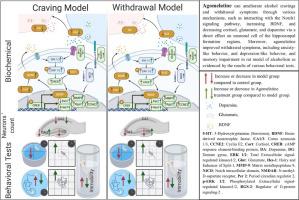Our official English website, www.x-mol.net, welcomes your
feedback! (Note: you will need to create a separate account there.)
Agomelatine attenuates alcohol craving and withdrawal symptoms by modulating the Notch1 signaling pathway in rats
Life Sciences ( IF 5.2 ) Pub Date : 2021-08-25 , DOI: 10.1016/j.lfs.2021.119904 Doaa Fathi 1 , Ahmed I Abulsoud 2 , Muhammed A Saad 3 , Noha N Nassar 4 , Mina M Maksimos 5 , Sherine M Rizk 6 , Mahmoud A Senousy 6
Life Sciences ( IF 5.2 ) Pub Date : 2021-08-25 , DOI: 10.1016/j.lfs.2021.119904 Doaa Fathi 1 , Ahmed I Abulsoud 2 , Muhammed A Saad 3 , Noha N Nassar 4 , Mina M Maksimos 5 , Sherine M Rizk 6 , Mahmoud A Senousy 6
Affiliation

|
Alcohol abuse is a significant causative factor of death worldwide. The Notch1 signaling pathway is involved in alcohol tolerance, withdrawal and dependence. Agomelatine is a known antidepressant acting as a melatonin receptor (MT1/2) agonist and a 5-hydroxytryptamine receptor-2C antagonist. However, its effects on alcohol cravings and alcohol withdrawal symptoms have not been investigated. In this study, we assessed the possibility of using agomelatine for the treatment of these symptoms in a rat model of alcoholism and the possible role of Notch1 signaling. We induced alcoholism in rats using a free-choice drinking model for 60 days. From day 61, free-choice was continued until day 82 for the craving model, whereas only water was offered in the withdrawal model. Meanwhile, the treated groups for both models received agomelatine (50 mg/kg/day) orally from day 61 to 82, followed by behavioral, histopathological and biochemical assessment. Agomelatine treatment caused significant decrease in alcohol consumption with a positive effect on anxiety-like behavior in the open field, memory in the Morris water maze and immobility in the forced swim test. Moreover, agomelatine induced the expression of Notch1 pathway markers, including Notch1, NICD, CREB, CCNE-2, Hes-1, both total and phosphorylated ERK1/2, MMP9, Per2and RGS-2 in the hippocampal formation. By contrast, NMDAR expression was reduced. Furthermore, agomelatine normalized the serum levels of BDNF, cortisol, dopamine and glutamate which were disrupted by alcohol consumption. Based on these findings, agomelatine reversed alcohol cravings and withdrawal symptoms associated with alcohol dependence by modulating the Notch1 signaling pathway.
中文翻译:

阿戈美拉汀通过调节大鼠的 Notch1 信号通路减轻酒精渴望和戒断症状
酗酒是全世界死亡的一个重要原因。 Notch1 信号通路涉及酒精耐受、戒断和依赖。阿戈美拉汀是一种已知的抗抑郁药,可作为褪黑激素受体 (MT1/2) 激动剂和 5-羟色胺受体 2C 拮抗剂。然而,它对酒精渴望和酒精戒断症状的影响尚未得到研究。在这项研究中,我们评估了在酒精中毒大鼠模型中使用阿戈美拉汀治疗这些症状的可能性以及 Notch1 信号传导的可能作用。我们使用自由选择饮酒模型诱导大鼠酗酒 60 天。从第 61 天开始,对于渴望模型,自由选择一直持续到第 82 天,而在戒断模型中,只提供水。同时,两种模型的治疗组在第 61 至 82 天口服阿戈美拉汀(50 mg/kg/天),然后进行行为、组织病理学和生化评估。阿戈美拉汀治疗可显着减少饮酒量,并对开放场地中的焦虑样行为、莫里斯水迷宫中的记忆力和强迫游泳测试中的不动能力产生积极影响。此外,阿戈美拉汀诱导海马结构中Notch1通路标志物的表达,包括Notch1、NICD、CREB、CCNE-2、Hes-1、总ERK1/2和磷酸化ERK1/2、MMP9、Per2和RGS-2。相比之下,NMDAR 表达减少。此外,阿戈美拉汀使因饮酒而受到破坏的 BDNF、皮质醇、多巴胺和谷氨酸的血清水平恢复正常。基于这些发现,阿戈美拉汀通过调节 Notch1 信号通路来逆转与酒精依赖相关的酒精渴望和戒断症状。
更新日期:2021-08-25
中文翻译:

阿戈美拉汀通过调节大鼠的 Notch1 信号通路减轻酒精渴望和戒断症状
酗酒是全世界死亡的一个重要原因。 Notch1 信号通路涉及酒精耐受、戒断和依赖。阿戈美拉汀是一种已知的抗抑郁药,可作为褪黑激素受体 (MT1/2) 激动剂和 5-羟色胺受体 2C 拮抗剂。然而,它对酒精渴望和酒精戒断症状的影响尚未得到研究。在这项研究中,我们评估了在酒精中毒大鼠模型中使用阿戈美拉汀治疗这些症状的可能性以及 Notch1 信号传导的可能作用。我们使用自由选择饮酒模型诱导大鼠酗酒 60 天。从第 61 天开始,对于渴望模型,自由选择一直持续到第 82 天,而在戒断模型中,只提供水。同时,两种模型的治疗组在第 61 至 82 天口服阿戈美拉汀(50 mg/kg/天),然后进行行为、组织病理学和生化评估。阿戈美拉汀治疗可显着减少饮酒量,并对开放场地中的焦虑样行为、莫里斯水迷宫中的记忆力和强迫游泳测试中的不动能力产生积极影响。此外,阿戈美拉汀诱导海马结构中Notch1通路标志物的表达,包括Notch1、NICD、CREB、CCNE-2、Hes-1、总ERK1/2和磷酸化ERK1/2、MMP9、Per2和RGS-2。相比之下,NMDAR 表达减少。此外,阿戈美拉汀使因饮酒而受到破坏的 BDNF、皮质醇、多巴胺和谷氨酸的血清水平恢复正常。基于这些发现,阿戈美拉汀通过调节 Notch1 信号通路来逆转与酒精依赖相关的酒精渴望和戒断症状。











































 京公网安备 11010802027423号
京公网安备 11010802027423号